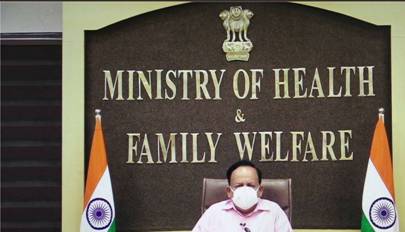The Union Minister of Health and Family Welfare, Science & Technology and Earth Sciences, Dr Harsh Vardhan, has underlined the need for long-term solutions to manage biomedical waste to ease the pressure on Health and Environment, specifically in a pandemic like situation. His message was read out at a recent webinar.
“The need for biomedical waste management is quite significant today, there is a need for strict compliance of the rules and regulations already in place for safe disposal of such biomedical waste,” he added while thanking India Water Foundation (IWF) and United Nations Environment Programme (UNEP) for supporting member states, including India, through an environmental strategy to protect people.
The high-level webinar on ‘The Future of Liquid Waste Management amidst Covid-19: What lies ahead?’ was jointly organized by the India Water Foundation (IWF) and United Nations Environment Programme (UNEP) supported by the Department of Science & Technology (DST), Government of India and Department of Drinking Water and Sanitation, Ministry of Jal Shakti recently. The webinar focused on the future of liquid waste management and the effective management of biomedical waste.
The main objective was to have a holistic understanding of various facets of waste management in Covid-19 and socio-environmental impacts. The sudden onset of the Covid-19 pandemic in early 2020 has imposed massive health and economic burdens on communities worldwide and affected every sector of society, including the waste-water sector. Among all the categories of biomedical waste, liquid wastes pose a severe threat to human health and the environment because of their ability to enter watersheds, pollute groundwater and drinking water when improperly handled and disposed of.
Professor Ashutosh Sharma, Secretary, DST, highlighted innovations to tackle this waste that have been developed in the last 4-5 months, like garbage bins with virus-neutralizing inner lining for hospitals by institutions like Sree Chitra Tirunal Institute for Medical Sciences & Technology, Trivandrum. They are now being produced commercially.
Sharma explained the connection of water with a range of sectors. “75% of the water goes to Agriculture, and there is also a nexus between water and health, especially in the times of Covid-19. Even when the Covid-19 would disappear from the world, water problems would still be there. Science & Technology is not the limiting factor to prevent the use and abuse of water. There are a whole lot of factors like economics of situation, public behaviour, and awareness in the society which need to be focused to prevent the abuse of water,” he pointed out.
“The upcoming Science, Technology and Innovation Policy, 2020 with a very wide stakeholder consultation will address many of the issues connected to water,” added Sharma.
Speakers highlighted the lack of reliable data on sewage generation, treatment of sewage, and capacity utilization of the existing sewage treatment infrastructure.









